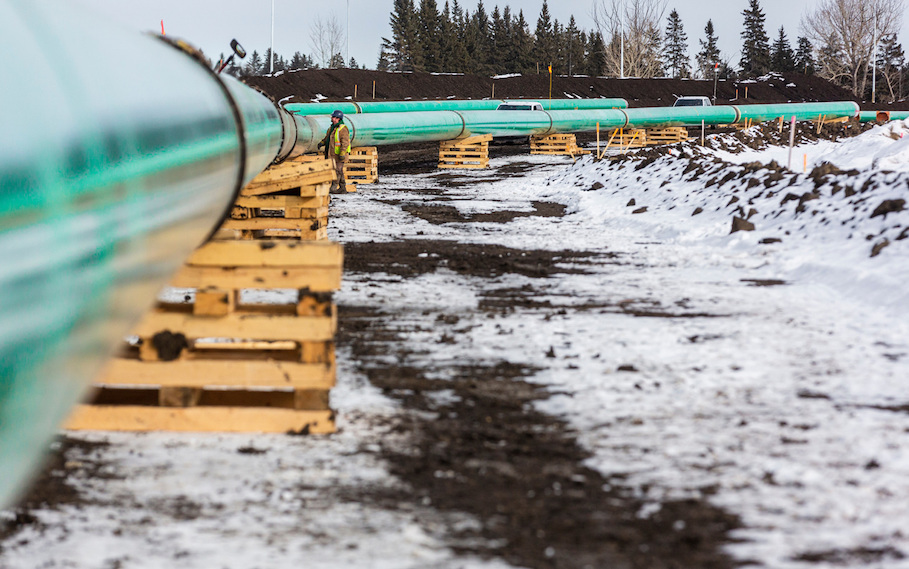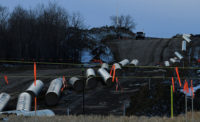Canada’s top energy sector regulatory agency has stepped in to shield the Trans Mountain pipeline and its multi-billion-dollar expansion project from efforts by environmental opponents to interrupt its completion.
The Canada Energy Regulator ruled late last month that the pipeline, which pumps oil from Alberta to the coast of British Columbia, does not have to publicly reveal identities of its insurance carriers.
While the ruling applies only to the existing pipeline, and not to its $10.2-billion expansion now under way, loss of coverage on the former could fatally undermine the financial stability of the now government-owned pipeline corporation and, by extension, the project under construction, said the regulator.
The expansion, which involves building several hundred miles of new pipeline parallel to the existing one, is struggling with fierce opposition, ballooning costs and the potential of declining future oil demand.
Even so, insurer Argo Group International Holdings Ltd., a unit of Lloyd's of London, will not renew coverage of Trans Mountain when its policy expires in August, with a spokesman saying the project "is not currently within Argo's risk appetite," according to a June 3 Canadian Broadcasting Corp. report.
Prime Minister Justin Trudeau’s Liberal government bought the pipeline for $3.7 billion in 2018 after its previous owner, Texas-based Kinder Morgan, decided it would be too risky to move forward with the expansion.
“Sharing the names of Trans Mountain’s insurers could reasonably be expected to make it harder for [it] to get insurance at a reasonable price and prejudice its competitive position,” the agency ruled on April 29.
In 2020, Trans Mountain listed insurers that included Zurich Insurance Co. Ltd., Energy Insurance Mutual Ltd., Chubb Insurance and Liberty Mutual Insurance Co., but Zurich opted last year not to renew coverage, according to insurance sector publication reports. The insurer did not publicly comment.
A spokesperson for Trans Mountain said the company was “pleased” with the regulator's decision that it “has all the required and necessary insurance in place for our existing operations and the expansion project.”
Trans Mountain’s insurance coverage issues emerge as environmental activists and other opponents ramp up attacks on the troubled project.
Tough Completion
After a mandated safety shutdown in December, construction crews were forced to stop construction in April for four months on one kilometer of pipeline work in Burnaby, B.C. after a group called Community Nest Finding Network raised issues with federal environmental officials about disruption to hummingbird nests. The halt in work comes with 20% of the Trans Mountain expansion complete.
In a statement, Trans Mountain says the delay will not impact either project cost or timetable, with work still on track to wrap up in December 2022.
The project will add 980 km of new pipeline, while tripling oil carrying capacity to 890,000 barrels per day, up from 390,000.
To stay in compliance with Canadian regulations, Trans Mountain must maintain $1 billion in financial resources, including “insurance policies; escrow agreements; letters of credit; lines of credit; surety bonds; and, cash or cash equivalents,” the energy regulator noted.
In its request to keep insurers confidential, Trans Mountain contended that “certain parties” have been combing public records to determine which are involved, with an eye to exerting pressure on firms to drop coverage.
In making its case to the agency, Trans Mountain said disclosing insurer names previously had resulted in loss of coverage, a drop in number of insurers willing to offer it and “significantly higher cost,” according to the ruling.
The regulator noted the potential of “ongoing targeting and pressure placed on insurers which could be expected to have the same result,”
Opponents Remain Committed
In a letter to the agency, environmental opponent Stand.earth blamed Trans Mountain insurance challenges on “wider trends in the insurance industry, and growing awareness by financial institutions that climate change is a threat to their bottom lines.”
It vowed to continue its campaign to dissuade insurers from doing business with Trans Mountain, even with insurer names withheld. Among other actions, Stand.earth confirmed it has written to the CEO of Liberty Mutual, which the pipeline had noted in its filing.
Trans Mountain is right to be concerned about the potential threat posed if it were required to name insurers, said Tom Gunton, a professor at Simon Fraser University and director of its resource and environmental planning program.
The insurers would likely find it difficult to be targeted by environmental groups, with the decision to do business with Trans Mountain potentially clashing with their own public commitments on climate change, he said.
Difficulty in obtaining insurance - or having to pay more for coverage - would also only further add to Trans Mountain’s financial challenges.
“Trans Mountain is facing financial headwinds because the decline of the oil markets will cause both insurers and lenders to be increasingly concerned about the corporation’s ability to cover its debts and liabilities,” Gunton said.
Gunton said the ruling raises questions about transparency, particularly for a government owned entity.
But the ruling said the agency has previously allowed other companies to hold back information related to insurance coverage, and that neither existing law nor regulations ”have different disclosure requirements for Crown corporations” from others.





Post a comment to this article
Report Abusive Comment